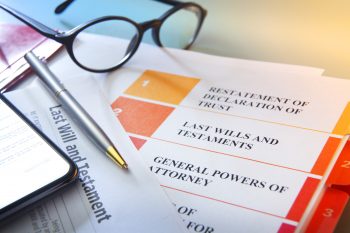How to help your Executor after you’ve passed away

When you choose someone to act as the Executor in your Will, you’re giving them the responsibility of taking charge of your estate after you pass away because you trust them and you are confident that they will carry out your wishes. It’s a role not to be taken lightly and it could take up a serious amount of their time, as your Executor will have the responsibility of applying for probate, paying liabilities, closing accounts, distributing assets and acting on your other wishes.
Even in the absence of any disputes surrounding the estate, the task of performing these responsibilities can be daunting for an Executor especially for a first timer. It becomes more difficult if they encounter setbacks such as not being able to find required documents or only finding aged information about your assets and liabilities.
To avoid delay, inconvenience and expense it makes sense to help your Executors by ensuring they have access to everything they need when the time comes for them to administer your estate. There are a number of things you can do to while you are alive to assist them including the following:
1. Make sure you know where your original current Will is stored
This is the first and most crucial step if you want your Executor to work on your estate. Your Executor can only act on behalf of your estate if they have the original of your signed last Will. Your Executor will need this document when they seek Probate so make sure they are aware where it is held and if you so wish, provide them with a copy of it.
2. Prepare an inventory of all your assets and liabilities
Another document required for Probate is an inventory of assets and liabilities of your estate. By preparing the inventory, your Executor will have an easier time in preparing and lodging the application for Probate. Assets you may have include bank accounts, properties, shares owned in companies, motor vehicles and superannuation while liabilities include mortgages, loans, credit card debts etc
When listing down your assets, make sure your assets are properly described. In the case of properties, for example, list down all your properties, the address of property, title details, and whether it is held by you solely or with another person (and if so, the name of the other/s, your share in the property and the nature of ownership with them i.e. joint tenants or tenants in common). For bank accounts, list down all the bank account numbers and names under which they are held (either by you solely or with another person and their name/s).
It’s important to revise the list regularly and whenever you acquire or dispose of a significant asset or incur a substantial liability.
3. Prepare a list of contact details of your professional advisers
You can help your Executor by providing them with the names and contact details of your professional advisors as these advisors will likely hold information your Executor will need access to. This is particularly the case in respect to your solicitor, accountant, financial planner and life insurance agent.
They can also help your Executor perform their responsibilities. The solicitor whom you entrusted with the safekeeping of your current Will can give it to your Executor and can possibly assist them in applying for Probate and administering your estate, while your accountant can provide advice in relation to the lodgement of any estate taxation returns.
4. Put all your documents in a place where your Executor can find them.
Another time-consuming task undertaken by your Executor is locating your relevant legal and personal documents. You can save time, their time by gathering all your important documents together and storing them in a safe place for easy access by your Executor. It is advisable to include copies of the following documents (or the originals if they are held by you):
- Your current Will
- Powers of Attorney
- Appointment of Enduring Guardian
- Birth Certificate
- Marriage Certificate
- Citizenship Certificate, if naturalised
- Certificates of Titles for properties
- Life insurance policies
- Share certificates, brokerage statements and other documents of title of your investments
- Superannuation Binding death benefit nominations
- List of assets and liabilities
- List of contacts of professionals and advisers
- Details of any safe or safe deposit box you use
- Motor Vehicle registrations
The location of the documents should be secure and if possible protected from fire, storm and flood. Ideally you would scan all the documents and create a parallel electronic copy so that if the physical documents are lost or destroyed your electronic copies will be sufficient for your Executor to administer your estate.
By doing all of these things, you can make life easier for your Executor in performing their duties. Planning ahead ensures that your estate can be administered and your wishes carried out with as little fuss and problem as possible and will avoid unnecessary delays and costs.
If you would like further information about any of the above matters or wish to discuss estate planning or making or reviewing a Will please contact Lisa Delalis or John Bateman of our office 02 4731 5899 or email willsestates@batemanbattersby.com.au.
Download PDF Version:
How to help your Executor after you've passed away